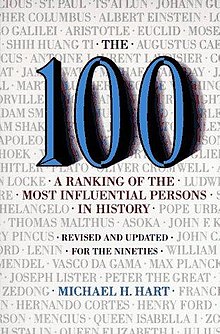The 100: A Ranking of the Most Influential Persons in History is a 1978 book by the American author Michael H. Hart. Published by his father's publishing house, it was his first book and was reprinted in 1992 with revisions. It is a ranking of the 100 people who, according to Hart, most influenced human history.[3][4][5][6] Unlike various other rankings at the time, Hart was not attempting to rank on "greatness" as a criterion, but rather whose actions most changed the course of human history.
 Cover of the 1992 edition | |
| Author | Michael H. Hart |
|---|---|
| Country | United States |
| Language | English |
| Series |
|
| Subject |
|
| Published | 1978 (Hart Publishing company, New York)[1][2] |
| Media type | |
| ISBN | 9780806513508 |
| OCLC | 644066940 |
Summary
The book consists of 100 entries as well as an appendix of Honorable Mentions. Each entry is a short biography of the person, followed by Hart's thoughts on how this person was influential and changed the course of human history. He gave additional credit for importance for people whose actions Hart felt were unusual, unlikely, or ahead of their time compared to a hypothesized course of history had this person not lived.
Founders and shapers of successful religions were among the most influential in Hart's view, as these shaped many people's lives quite strongly over a long period of time. The first person on Hart's list is the Islamic prophet Muhammad.[7][8] Hart asserted that Muhammad was "supremely successful" in both the religious and secular realms, being responsible for both the foundations of Islam as well as the Early Muslim conquests uniting the Arabian Peninsula and eventually a wider caliphate after his death. Hart also believed that Muhammad played an unusually singular and personal role in the development of Islam.[9][10] The development of Christianity, by contrast, has its influence split between Jesus's initial teachings and foundational work, and Paul the Apostle, who played a pivotal role in the early spread of Christianity as well as distinguishing its doctrines and practices from Judaism and the other Greek and Roman religions of the time period.[11] Gautama Buddha, Confucius, and Moses are all placed highly as well due to their role in establishing religions.
One of the most notable omissions was Abraham Lincoln, which Hart relegated to the "Honorary Mentions" in the appendix. Changes in the 1992 revision include the rankings of figures associated with Communism being lowered after the Revolutions of 1989, such as Vladimir Lenin and Mao Zedong, and the introduction of Mikhail Gorbachev. Hart took sides in the Shakespearean authorship issue and replaced William Shakespeare with Edward de Vere, 17th Earl of Oxford in the 1992 version. Hart also substituted Niels Bohr and Henri Becquerel with Ernest Rutherford. Henry Ford was promoted from the "Honorary Mentions" list, replacing Pablo Picasso. Finally, various rankings were re-ordered, although no one listed in the top ten changed their position.[3]
The book was first published in 1978 as imprint from "Hart Publishing Company".[1][2] According to the Calgary Herald, at least 60,000 copies were sold.[12] The book has since been translated into many languages.[13]
Hart's Top 10 (from the 1992 edition)
| Rank | Name | Time frame | Image | Occupation |
|---|---|---|---|---|
| 1 | Muhammad | c. 570–632 |  | Spiritual & Political leader |
| 2 | Isaac Newton | 1643–1727 |  | Scientist |
| 3 | Jesus | 4 BC–33 AD |  | Spiritual leader |
| 4 | Gautama Buddha | 563–483 BC |  | Spiritual leader |
| 5 | Confucius | 551–479 BC |  | Philosopher |
| 6 | Paul the Apostle | 5–67 AD |  | Christian apostle |
| 7 | Cai Lun | 50–121 AD |  | Inventor of paper |
| 8 | Johannes Gutenberg | c. 1400–1468 |  | Inventor of the printing press |
| 9 | Christopher Columbus | 1451–1506 |  | Explorer |
| 10 | Albert Einstein | 1879–1955 |  | Scientist |
Reception
For placing Muhammad in first place of the list, the book received several controversial reviews from western critics,[25] but the book was widely welcomed and outburst with positive reviews in the Muslim world, and the book is often cited in the Muslim writers' book including Ayatollah Sayed Muhammad al-Shirazi, Ahmed Deedat etc.[26][27][28][29][30] In 1988, the former contemporary Egyptian president Hosni Mubarak honored Michael Hart for placing Muhammad in first place.[31] Steven Skiena and Charles Ward writes in their book Who's Bigger?: Where Historical Figures Really Rank that The 100: A Ranking of the Most Influential Persons in History "is probably the best known ranking of historic figures by influence."[32]
Sequel
Hart wrote the 1999 follow-up A View from the Year 3000,[33] voiced in the perspective of a person from that future year and ranking the most influential people in history. Roughly half the entries are fictional people from 2000 to 3000, but the remainder are taken mostly from the 1992 ranking, with some sequence changes.[34][35]